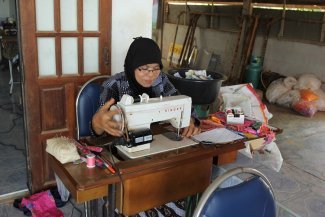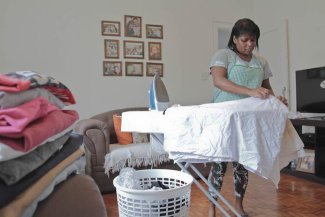In this July 2021 photograph, Geta Murgoci, a 56-year-old Romanian domestic worker who has been living in Italy for 17 years, stands at the entrance to the home of the elderly woman that she works for in Rome.
“I was living with a lady who was bedridden when the pandemic broke out. Luckily, I had a contract and I was paid for all my work. I never left the house, except for rushing out, terrified, to do the shopping and to pick up the lady’s medication. Her daughter wasn’t living in Rome and she wasn’t able to visit her, so I would video call her every day so that they could see each other at least. Those were the only times when the lady was a little calmer.”
The words of this 56-year-old Romanian home carer, Geta, who has been living in Italy for 17 years, shine a light on the tremendous value of the role played by these workers during the pandemic in Italy. At a time when several million dependent elderly people found themselves completely isolated, it was thanks to carers that many continued to receive the care they needed in their homes. They were often the only ones who were there to support them during that traumatic period, and who prevented them from having to go into care homes, which were hotbeds of transmission at the time.
Italy has the highest average age in Europe (46.7 years) and the highest proportion of elderly people (22.8 per cent over 65). In contrast to Northern European countries, where public services provide care for dependent persons, in Italy, the responsibility falls mainly on the family, and almost exclusively on the women members, which is why reliance on paid domestic workers is so high, amongst the highest in Europe. There were almost one million declared domestic workers in Italy in 2020 (920,722 according to Italy’s Domestic Workers Observatory). It would be more accurate to talk of women workers, as 90 per cent are female, and 70 per cent of these women are migrant workers, mainly from Eastern Europe. Although very much ‘pink-collar’ work, it is also ‘black’, with an estimated 60 per cent of Italy’s domestic workers undeclared. This translates as around 1.3 million people with no rights, leaving them much more vulnerable to abuse and injustice.
When the pandemic hit Italy, domestic workers found themselves in a particularly difficult situation. The work they do carries a high risk of infection, with social distancing not being an option and many of them having to go from one house to another.
“When the Italians found themselves without work, or working from home, many of them sacked their domestic workers, especially those without contracts, to save money,” says Silvia Dumitrache of the Romanian Women’s Association in Italy (ADRI). “For the live-in workers, it was a tragedy. From one day to the next, they found themselves without work and without a roof over their heads. They didn’t know where to go, they couldn’t go back to their countries of origin and many were left out on the street.”
The few declared workers were not treated any better by the state, despite the role they played during the pandemic. “The ‘Cura Italia’ decree of 17 March 2020 – despite the name, ‘Cura’, meaning ‘care’ – specifically excluded care workers from access to partial unemployment and the ban on dismissals,” explains Raffaella Sarti, professor of gender history at the University of Urbino. “No specific protection was provided for them, despite the risk of infection. The decree instantly sparked protest because it violated ILO [International Labour Organization] Convention 189 of 2011, which undertakes to eliminate all forms of discrimination against domestic workers.”
“All other categories of workers were provided for, but they were ignored,” says Giamaica Pontillo of the AcliColf domestic workers’ union. “The work they do is essential in our country, but their employment status is neither recognised nor protected.”
Tzvetanka is a 52-year-old Bulgarian domestic worker who has been living around Milan for 22 years. She contracted a kidney infection, then Covid-19, and lost her mother, who was living in Bulgaria. “Between being in hospital and then having to self-isolate, I wasn’t able to work for over a month, but I discovered that you are only entitled to 15 days sick leave a year, even during the pandemic. I lost my job. I had nothing to live on. We had it thrown in our faces that we are no more than second-class citizens.”
Domestic workers held to ransom
The pandemic did bring one positive change, for some. For fear that surveillance of their employees’ movements during lockdown would lead to sanctions, some employers decided to regularise the status of their domestic workers. The government then tried to encourage the formalisation of this army of invisible workers by providing for their regularisation in the ‘Rilancio’ (‘Relaunch’ in Italian) decree of 19 May 2020. By paying a contribution of €500, employers could regularise the status of people doing undeclared domestic work for them, enabling foreign workers to obtain a residence permit. For the INPS (National Social Security Institute), this explains the 7.5 per cent increase (64,529) in the number of employment contracts in this sector compared to the previous year. Still, it represents a drop in the ocean of undeclared domestic work.
“From now on, thanks to the choices made by this government, the invisible will be less invisible,” Teresa Bellanova, minister of agriculture in Giuseppe Conte’s second government, who promoted the regularisation measure, announced with tears in her eyes in May 2020. Over a year later, however, of the 220,000 applications made, only 14 per cent have been assessed and 11,000 residence permits (5 per cent) have been issued, as revealed in the latest report by the Ero Straniero network, which is promoting a new law on immigration. “We are sounding the alarm, and with urgency,” says Giulia Crivellini, treasurer of the Radicali Italiani party, which is backing the campaign.
“Two hundred thousand people have been trapped in an unbearable limbo for over a year. We are talking about foreign citizens who have been working in our country for years without any rights. They were promised a solution and now they feel betrayed.”
Thirty-six-year-old Flor is from El Salvador and has been working as a domestic worker in Italy since 2008. In February 2020, she started working, without a contract, for an elderly couple in Milan, until she fell ill with Covid-19 in December. “I felt too ill and couldn’t work, but I found a young woman to replace me for a month,” she says. “When I came back, my employers hadn’t paid her and I had to pay her out of my own pocket. I went back to work for them, but then they got sick.
The hospital would call me for news because they didn’t have any relatives here.” Then a cousin from Sicily surfaced. She spoke to Flor on the telephone, before the lady died, and promised to pay her. “But when she got to Milan, she changed completely. She didn’t pay me and started insulting me. That’s how she thanked me for everything I had done from December to April. We had started the regularisation procedure with the man of the house, but now she doesn’t want to sign the documents and I don’t know what’s going to happen. I don’t understand why people behave this way.”
“The regularisation process gives the employer alone the authority to submit the application,” denounces Roberto Reyes of the Non Possiamo Più Aspettare (We Can’t Wait Any Longer) network. “As a result, the longer the procedures drag on, the more they hold the workers like slaves, blackmailing them and threatening them. These women are often subjected to violence, but they cannot leave until they have a residence permit. Even the lawyers take advantage of the situation and make money out of it, shamelessly playing on their fear.” Many foreign women report finding themselves in this situation, like Rosa (not her real name), an undocumented Peruvian domestic worker who was swindled by a lawyer who threatened to report her to the athorities and to have custody of her daughter taken away from her, to make her pay for non-existent procedures.
The Ero Straniero network talks about the phenomenon of domestic workers being held to ransom. “Beyond the personal tragedies, this impasse has enormous repercussions for public health,” denounces Crivellini. “Without a residence permit, despite being entitled, many people are denied access to the vaccination campaign.”
“The regularisation programme reveals that our country only deals with this issue when it is faced with an emergency,” remarks Emanuela Loretone of the CGIL trade union confederation. “To protect these people, we need a structural approach to regular migration flows at the national and European level.” The bill proposed by the Ero Straniero network, which links regularisation and a system of legal entry channels into Italy, has been stalled in parliament since March.
Jessica, a 26-year-old Colombian domestic worker, has been working without papers in Italy for four years. She has applied for regularisation but has been waiting for a response for over a year. “We feel like prisoners during this waiting period. We don’t know what to do,” she says, bitterly. “I can’t go back to Colombia, where my daughters are, until I have a residence permit. The youngest is four years old. I had to leave straight after giving birth and I have only seen her grow up on video, on a screen, ever since.”
Silvia Dumitrache of the ADRI say “the figures are clear: seven out of ten pensioners cannot afford declared home help on their incomes. The state knows this but does nothing about it. There is a lot of rhetoric about the crucial role these workers play, but it is institutionalised exploitation. They are not only invisible, they are deliberately ignored.”













